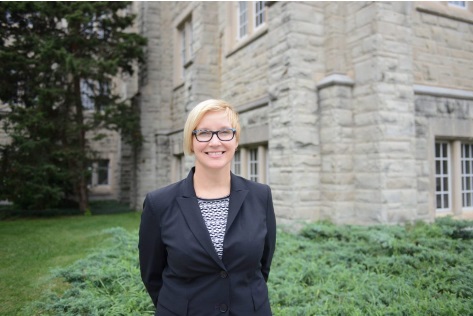By Max Martin, Special to Western News
A first-of-its-kind study by Schulich Medicine & Dentistry researchers dispels a controversial gender dysphoria theory that activists and experts have called inaccurate and harmful to transgender people.

Greta Bauer (Photo courtesy of Schulich Medicine and Dentistry)
Greta Bauer, PhD, and her team at Trans Youth CAN! found no evidence in a recent study to support the idea of rapid onset gender dysphoria (ROGD) - a proposed condition often used as an argument against providing gender-affirming medical care to young people.
"It's impacting policy, and there is no research on any actual adolescents that supports this hypothesis," said Bauer, professor in the department of epidemiology and biostatistics at Schulich Medicine & Dentistry and the CIHR Sex and Gender Science Chair.
Gender dysphoria is the condition of feeling one's gender identity to be at variance with the gender they were assigned at birth.
In 2018, researchers in the U.S. claimed ROGD was a unique pathway in which youth going through puberty experienced sudden gender dysphoria influenced by social and peer contagion along with other factors including poor mental health or parent-child conflict.
Bauer said that paper has "taken on a life of its own" in the three years since its publication, purporting that youths' gender identity could be influenced by their queer peers and fuelling the notion that young people might identify as trans or non-binary as part of a temporary phase.
"The ROGD hypothesis perpetuates the fear that says, you shouldn't let your kids hang out with trans people.' It's harmful," Bauer said. "Socially, that's a really horrible message and ostracizing for youth who are trans or non-binary."
The 2018 study - conducted through an online survey of parents - also sparked concerns around offering gender-affirming medical care to youth, fearing it might be regretted later in life.
While many have taken aim at the study's methods, a test of the theory using clinical data from actual teens and adolescents had never been completed until now.
Findings from Trans Youth CAN! - a study of youth referred for blockers or hormones at 10 clinics in Canada - were recently published in the Journal of Pediatrics.
Researchers analyzed clinical data from 173 Canadian trans adolescents seen in 10 gender clinics. They tested for 13 factors that would be consistent with the ROGD hypothesis, including social contagion factors like the influence of online groups, as well as variables related to mental health and maladaptive coping.
Bauer and her team found nothing in their analysis to support rapid-onset gender dysphoria being a distinct clinical phenomenon.
Recent gender knowledge was not significantly associated with depressive symptoms, psychological distress, past diagnosis of mental health issues or neurodevelopmental disorders, gender dysphoria symptoms, self-harm or past-year suicide attempt.
Social factors, including having gender-supportive online friends, general support from online or trans friends, and gender support from parents also did not have a significant impact on gender identity, the data showed.
In a finding directly opposed to the ROGB hypothesis, recent gender knowledge was actually associated with lower anxiety and a lower prevalence of marijuana use.
"This research is the first to show that more recent knowledge of gender was not associated with having online friends, trans friends or mental health issues," said Dr. Margaret Lawson, Trans Youth CAN!'s co-principal investigator and professor of pediatrics at the University of Ottawa. "These results are extremely important because they dispel a theory that had been circulated without evidence."
Many trans adolescents and adults report having been aware of their gender identity at a young age, with about 80 per cent knowing their gender was different than what was assigned at birth before age 14, Bauer said.
About 0.5 per cent of the adult population are trans.
Puberty has long been understood as one period where gender dysphoria often first emerges, however, only a small portion of trans youth receive gender-affirming care as adolescents.
"It's important to ensure the people who are getting treatment are going to benefit from it," Bauer said. "We want to make sure patients are getting what they need, that's the importance of medical research."
Bauer hopes her recent findings help dispel misconceptions around youth identifying as trans and seeking gender-affirming medical care.
"The benefits of being able to start treatment at a younger age are substantial, it has a lot of advantages," Bauer said. "We hope that by identifying and intervening at a younger age, we can prevent some of the mental health challenges we see in the adult trans community."
"This research will contribute to trans youth, like all youth, being accepted for who they are," Lawson added. "It will also help parents accept their youth's gender, realizing that nobody chooses to be transgender nor can anyone make someone transgender. What trans youth need is acceptance and support from their families and community."













